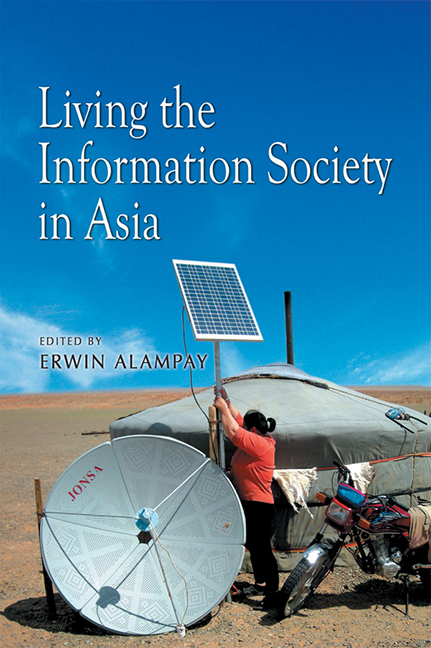Book contents
- Frontmatter
- Contents
- Foreword
- Preface
- List of Abbreviations
- Contributors
- Introduction: Perspectives of ICT Research in Asia
- 1 What Would Durkheim Have Thought? Living in (and with) the Information Society
- 2 What Is a Mobile Phone Relationship?
- 3 Technologies of Transformation: The End of the Social or the Birth of the Cyber Network?
- 4 Becoming Mobile in Contemporary Urban China: How Increasing ICT Usage Is Reformulating the Spatial Dimension of Sociability
- 5 Mobile Religiosity in Indonesia: Mobilized Islam, Islamized Mobility and the Potential of Islamic Techno Nationalism
- 6 Moral Panics and Mobile Phones: The Cultural Politics of New Media Modernity in India
- 7 Stories from e-Bario
- 8 Life and Death in the Chinese Informational City: The Challenges of Working-Class ICTs and the Information Have-less
- 9 Institutional Responses to GIS Adoption for RPTA in Local Governments
- 10 Customer Acquisition among Small and Informal Businesses in Urban India: Comparing Face-to-Face and Mediated Channels
- 11 The View from the Other Side: The Impact of Business Process Outsourcing on the Well-being and Identity of Filipino Call Centre Workers
- 12 Empowering Thai Homeworkers through ICTs
- Index
8 - Life and Death in the Chinese Informational City: The Challenges of Working-Class ICTs and the Information Have-less
Published online by Cambridge University Press: 21 October 2015
- Frontmatter
- Contents
- Foreword
- Preface
- List of Abbreviations
- Contributors
- Introduction: Perspectives of ICT Research in Asia
- 1 What Would Durkheim Have Thought? Living in (and with) the Information Society
- 2 What Is a Mobile Phone Relationship?
- 3 Technologies of Transformation: The End of the Social or the Birth of the Cyber Network?
- 4 Becoming Mobile in Contemporary Urban China: How Increasing ICT Usage Is Reformulating the Spatial Dimension of Sociability
- 5 Mobile Religiosity in Indonesia: Mobilized Islam, Islamized Mobility and the Potential of Islamic Techno Nationalism
- 6 Moral Panics and Mobile Phones: The Cultural Politics of New Media Modernity in India
- 7 Stories from e-Bario
- 8 Life and Death in the Chinese Informational City: The Challenges of Working-Class ICTs and the Information Have-less
- 9 Institutional Responses to GIS Adoption for RPTA in Local Governments
- 10 Customer Acquisition among Small and Informal Businesses in Urban India: Comparing Face-to-Face and Mediated Channels
- 11 The View from the Other Side: The Impact of Business Process Outsourcing on the Well-being and Identity of Filipino Call Centre Workers
- 12 Empowering Thai Homeworkers through ICTs
- Index
Summary
INTRODUCTION
Are we living in an information society? Decades of debate have passed by (Kumar 1995; Duff 2000; May 2002; Webster 2002). Today, the notion of an information society — as a society consisting of its ordinary members, not just the elite — makes more sense than ever before. This is because of a single pivotal turn since the late-1990s: the spread of low-end information and communication technologies (ICTs) such as the Internet café (Slater and Tacchi 2004; Qiu and Zhou 2005) and, increasingly, inexpensive mobile phone services (Castells et al. 2006) that provides unprecedented information access to average people. This new class of ICTs are what we call working-class ICTs, which in the context of contemporary urban China refer more specifically to services such as the Internet café, prepaid phone cards, SMS, and the low-end mobile service, Little Smart (Qiu 2005, 2006). These newly connected people are what we call the information have-less, “an informational — and therefore social, economic, and political — category in the evolving network society, which sensitizes us to a new set of phenomena, problems, and policy options” (Cartier, Castells, and Qiu 2005, p. 10).
The rise of working-class ICTs and the information have-less constitutes a centrepiece of the information society at present, when this emerging techno-social system becomes more inclusive, of the forms of technologies, groups of people, accompanying social problems, and contradictions and dilemmas involved, with all the complexities and paradoxes of human society. This enlarged scope of the information society provides a fresh opportunity for the understanding of social issues in general, and the Chinese informational city in particular.
The concept of the informational city was developed by Manuel Castells to explain fundamental changes in the economic structure and industrial system of urban America, and is further expanded to account for a full range of social problems and social change facing cities in industrialized countries (1989a; 1989b; 1998). Similar processes of restructuring are also under way in China, although specific patterns characterize the Chinese transformation. This paper critically examines the social issues facing the Chinese informational city in the context of the techno-social emergence of working-class ICTs and the information have-less. By using the term “the Chinese informational city”, the discussion here is limited to urban China.
- Type
- Chapter
- Information
- Living the Information Society in Asia , pp. 130 - 157Publisher: ISEAS–Yusof Ishak InstitutePrint publication year: 2009

